Time to Say Goodbye
In honor of Samhain and Scorpio season, I’m making a decision to clear something from my life that hasn’t really been active for a while. I’ll no longer be writing new posts for either Radically Queer or Queer & Now. This isn’t a choice I make lightly, but I’ve realized that it’s time. I’m putting my energy primarily into my YouTube channel these days, where I post a mix of witchy/tarot/astrology content and the social justice topics you’ve come to expect from me. I actually have been consistently posting twice a month for a while now, so it feels like this is a sustainable thing. If you’re interested, I’d love for you to subscribe! I also continue to be active on Twitter with a mix of justice-y and personal content @queeractivist, and on Instagram with a mix of witchy/tarot and personal content @avoryfaucette. I will continue to renew this domain and keep all the content available. I also will probably drop a line here if I ever expand this content into an e-book, which may happen at some point. Thank you for reading and commenting over the years and I hope to see you on one of the above platforms!
Radical Reading: Trans Like Me
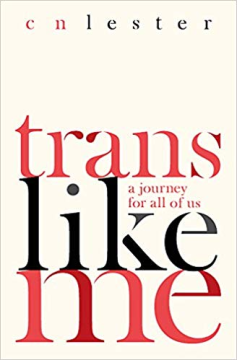 CN Lester’s Trans Like Me, out this summer in the U.S. from Seal Press, adds another strong voice to the growing chorus of trans authors writing about the trans experience from their own, uncompromising perspectives. Written in an accessible style, but heavily backed up by research, this book is not a trans memoir, but it does blend Lester’s own experiences as a non-binary trans person with observations on media, culture, medicine, and the law. Though the book jumps between a number of topics, I found a cohesive theme throughout around the question of who controls the trans narrative—and what they choose to keep or leave out.
CN Lester’s Trans Like Me, out this summer in the U.S. from Seal Press, adds another strong voice to the growing chorus of trans authors writing about the trans experience from their own, uncompromising perspectives. Written in an accessible style, but heavily backed up by research, this book is not a trans memoir, but it does blend Lester’s own experiences as a non-binary trans person with observations on media, culture, medicine, and the law. Though the book jumps between a number of topics, I found a cohesive theme throughout around the question of who controls the trans narrative—and what they choose to keep or leave out.
We Need to Think Differently About Love
Time for another rant about sexual and romantic scripts! Today’s pet peeve is how we talk about love, both finding and having it. Scripts on love are just chock full of mixed messages, and a lot of them are obnoxiously gendered.
We act like love, specifically romantic love, is the be-all and end-all for happiness. Being in love makes you complete and whole. Though these days we do caution folks to find their own happiness before seeking it in others, we still tend to consider romantic relationships part of a healthy life course. But at the same time, we often deem looking for love as almost pathological. People, particularly women, who are struggling to find romance are looked down upon, studied to within an inch of their life (what’s the Tinder trend of this week?) and hounded with advice. So you need love to be whole, but if you engage in a reasonable search for it, you’re suddenly just desperate?
It’s another example of how no one can win when following these scripts. Presumably, we’re supposed to just magically come upon our perfect mate, without emotional work or time spent in the dating pool. Spend too long looking and your social capital drops, and god forbid you’re aromantic or asexual and not interested in a partner. And this pressure falls disproportionately on women, with all the marketing and media focusing on how a woman has to be loved to feel happy and valued but very little focused on actively knowing how to love. Instead of hyperfocusing on the tactics of search, what if we turned this energy towards skills inside of a relationship, or how to figure out what it is you want, or how to identify when you’re loved by someone who isn’t healthy for you? Food for thought.
Tomorrow Will Be Different for Trans People
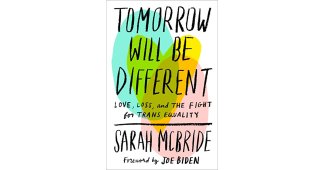 Tomorrow Will Be Different, and so will this memoir, written by trans activist Sarah McBride about her experiences since coming out in her senior year of college. I generally avoid trans memoirs, since the genre has become rather predictable and honestly a little depressing. But this book breaks out of that mold—though Sarah doesn’t shy away from discussing her experiences as a trans person, she also doesn’t conform to the genre. Her story is more a tale of coming into politics as a young adult, learning to balance professionalism with the authenticity of identity-based storytelling, and battling cancer as a young couple than it is a traditional trans memoir. She sprinkles in the statistics and legal realities of trans people throughout to educate the casual reader, but it’s really just a story, told by a bold and heartfelt young woman who’s been through way more than anyone should have to before reaching the age of 30.
Tomorrow Will Be Different, and so will this memoir, written by trans activist Sarah McBride about her experiences since coming out in her senior year of college. I generally avoid trans memoirs, since the genre has become rather predictable and honestly a little depressing. But this book breaks out of that mold—though Sarah doesn’t shy away from discussing her experiences as a trans person, she also doesn’t conform to the genre. Her story is more a tale of coming into politics as a young adult, learning to balance professionalism with the authenticity of identity-based storytelling, and battling cancer as a young couple than it is a traditional trans memoir. She sprinkles in the statistics and legal realities of trans people throughout to educate the casual reader, but it’s really just a story, told by a bold and heartfelt young woman who’s been through way more than anyone should have to before reaching the age of 30.
Tear-jerker warning: a lot of what Sarah writes about in this book is the ultimately tragic love story of her and her late husband, Andy, another trans activist who died of cancer a few years ago. I don’t know if folks who didn’t know Andy will do quite as much crying in airports as I did while reading this, but as a friend and former coworker of Andy’s, I was terribly struck by how the intimate version of the last couple of years of his life written by his wife aligned with my own experience of Andy as a person. Bright, fiercely dedicated, and hillarious, Andy was a hard worker whose efforts were instrumental in getting trans health care protections put into law, but he was also just an awesome person and I wish I’d been closer with him in his life. It was a little surreal to read about what was happening in Andy and Sarah’s private life as I was making bad oral sex jokes with them on Facebook and offering to teach Andy to sign if his tongue cancer made speech difficult. Even those who didn’t know Andy, I think, will have a hard time not getting emotional when they learn through Sarah what a sweet, romantic nerd he was, and how dedicated he was to improving trans peoples’ lives.
I don’t really know Sarah personally, but I feel like I do after reading this book. Some of her experiences ring so true for me, as she goes from terror around coming out to pleasant surprise at the positive reactions to political activism and ultimately pride in herself as a transgender person. I am so, so happy to read about kids like Lula who ask a question like “What’s your favorite part of being transgender?” as if there’s nothing unusual about it. I admit that I’ve sometimes been fiercely jealous of trans kids, but I think part of it is that, like Sarah, I look at them and see the authentic kid I could’ve been, if I were born just a little bit later. I’m happy that I’ve been even a tiny part of the national trans movement that has made their experiences possible.
And it’s the feeling of community of that movement that I think Sarah best brings to light in her account. DC can feel like a bubble sometimes, but the trans and queer movements really can be like a big family at times. Behind the big trans policy announcements of the last few years, there are spectacular people working tirelessly even as they go through their own struggles of bullying and bad breakups and figuring out family life. Even though I don’t currently work in the movement, I feel that I have a home there, and I’m happy to know that such awesome people are working to protect my rights even in terrifying political times. I’m also so happy to read a white trans activist like Sarah giving full credit to the trans folks of color who are much more marginalized and usually can’t get a book deal or the kind of spotlight that she has. She’s clear that while her own story is valuable as a tool for activism, she stands on the shoulders of giants whose names most of us will never know, and I can feel her commitment through her words to changing that world from a position of relative privilege.
Thinking About Power and Leadership Through a Dual (Not a Gendered) Lens
 Ten years ago this summer, I attended an event called Women & Power at the Omega Institute in New York. I was open about not being female-identified, but figured that the feminist focus of the weekend retreat would apply to a non-binary person as well. I remember being extremely turned off by the leader of the event, who spoke about femininity in this really essentialist way–about how as women, we had to reclaim a different kind of power that reflects feminine traits and values, because we’re all a sisterhood, bound by menstruation and reproductive cycles and yada yada. But as much as I was turned off by her delivery, ten years later I’m coming back to the core message about a different way of exercising power and leadership and thinking that I really wish we did talk more about that–just maybe not with such a focus on human gender.
Ten years ago this summer, I attended an event called Women & Power at the Omega Institute in New York. I was open about not being female-identified, but figured that the feminist focus of the weekend retreat would apply to a non-binary person as well. I remember being extremely turned off by the leader of the event, who spoke about femininity in this really essentialist way–about how as women, we had to reclaim a different kind of power that reflects feminine traits and values, because we’re all a sisterhood, bound by menstruation and reproductive cycles and yada yada. But as much as I was turned off by her delivery, ten years later I’m coming back to the core message about a different way of exercising power and leadership and thinking that I really wish we did talk more about that–just maybe not with such a focus on human gender.
The Coding of Resilience
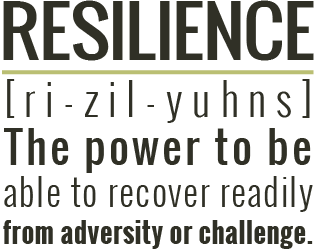 I’m starting to get tired of how often we describe oppressed communities and individuals with an awed praise of their “resilience.” Yes, oppressed folks are often resilient, and there are positive things in that recognition–it’s impressive how creative people can be under stress, how we can survive and sometimes even thrive in remarkable conditions. But praising resilience also hides a lot.
I’m starting to get tired of how often we describe oppressed communities and individuals with an awed praise of their “resilience.” Yes, oppressed folks are often resilient, and there are positive things in that recognition–it’s impressive how creative people can be under stress, how we can survive and sometimes even thrive in remarkable conditions. But praising resilience also hides a lot.
What does resilience really mean? That you’re strong? That you’re connected enough to survive? Who gets to choose who’s resilient and who isn’t? What conditions create resilience? This isn’t a word that we use for everyone. It has an undertone of “hey, good job not crumbling under the horrible thing we just now did to you!” and shifts the spotlight away from the oppressor’s culpability and even tries to reframe a terrible experience as positive. Yes, resilience is impressive, but you know what would be even more impressive? Not subjecting entire groups of people to slavery, genocide, torture, and other forms of oppression in the first place!
When we focus on resilience, we don’t focus on accountability. We’re not talking about how conditions of oppression are created by real live oppressors. We’re not talking about ongoing culpability or solutions that the oppressing group can enact to get the weight off the oppressed person’s back. Instead, we’re saying, please perform daring and magical feats for us with this weight on your back. We’re so impressed by your skill! Framing certain communities–often black women, trans folk, Native people–as “resilient” can be harmful and fail to recognize the harm actually done to those communities.
So when you read the word “resilient” to describe these communities and individuals, if you’re in an oppressing group, take a step back and think twice. Ask yourself, if these survivors are so resilient, who hasn’t survived? Who from the same community have we killed through war, environmental degradation, the criminal injustice system, and similar tactics? Instead of offering back pats for survival, let’s offer changed behavior and meaningful reparations for communities to rebuild.
My Relationship with Time and White Culture
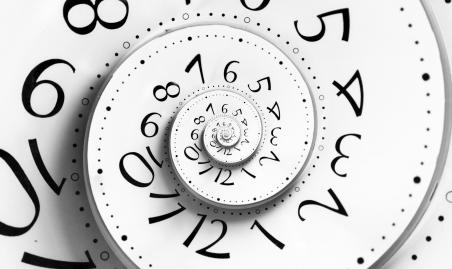 Recently, I worked with a coach who helped me to realize that I have a pretty messed up relationship with time. Namely, there’s some part of me that thinks I can “win” at time. Well, good luck with that, self. Working with her, I noticed that I’ve got a lot of personal baggage around time, but it’s also thoroughly wrapped up in white dominant culture and capitalism.
Recently, I worked with a coach who helped me to realize that I have a pretty messed up relationship with time. Namely, there’s some part of me that thinks I can “win” at time. Well, good luck with that, self. Working with her, I noticed that I’ve got a lot of personal baggage around time, but it’s also thoroughly wrapped up in white dominant culture and capitalism.
Plenty has been said about how white people view time as linear, and that’s sort of weird, but I hadn’t fully grasped it until I started thinking about how I view my long-term goals and values. I realized that I was thinking about most things in life as something I would build upon gradually, but ultimately max out towards the end of my life. In other words, there’s some ultimate goal that you’re trying to achieve on a more or less straight path. But in fact, that doesn’t make much sense. What I really want is to be able to live with my values and reach goals throughout my life, with a certain amount of flux expected for prioritizing and re-prioritizing alongside life circumstances.
What Is Romantic Attraction?
 I was just listening to the most recent episode of the Sexplanations podcast with Dr. Lindsey Doe, where she was joined by another favorite Youtuber of mine, Ash Hardell, to talk about asexuality. Though asexuality is ostensibly the theme of the show, they talk a lot about attraction in general, and different types of attraction–sexual, romantic, platonic, sensual, aesthetic, and alterous. It’s in the discussion of alterous attraction (something between platonic and romantic, such as a queerplatonic relationship), that something comes up that struck me as a bit more monoganormative and heteronormative than Dr. Doe’s usual default, so I thought I’d address it here.
I was just listening to the most recent episode of the Sexplanations podcast with Dr. Lindsey Doe, where she was joined by another favorite Youtuber of mine, Ash Hardell, to talk about asexuality. Though asexuality is ostensibly the theme of the show, they talk a lot about attraction in general, and different types of attraction–sexual, romantic, platonic, sensual, aesthetic, and alterous. It’s in the discussion of alterous attraction (something between platonic and romantic, such as a queerplatonic relationship), that something comes up that struck me as a bit more monoganormative and heteronormative than Dr. Doe’s usual default, so I thought I’d address it here.
Amerikan History Is White Imperialism: Pass It On
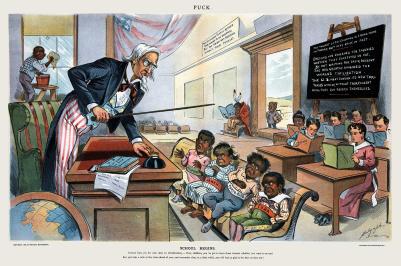 Over the past couple of weeks, I read a couple of critical autobiographies–those of Malcolm X and Assata Shakur. Reading them together, I was struck by a lot of things, but perhaps especially how enduring false narratives of this country are and how those narratives are perpetuated by white people. We hear this time and again from folks of color, how white people are often surprised by actions of the state or the actions of their fellow white folks, rather than recognizing these as enduring historical patterns that folks of color are plenty used to. Why are we so surprised? Why does our ignorance persist so doggedly?
Over the past couple of weeks, I read a couple of critical autobiographies–those of Malcolm X and Assata Shakur. Reading them together, I was struck by a lot of things, but perhaps especially how enduring false narratives of this country are and how those narratives are perpetuated by white people. We hear this time and again from folks of color, how white people are often surprised by actions of the state or the actions of their fellow white folks, rather than recognizing these as enduring historical patterns that folks of color are plenty used to. Why are we so surprised? Why does our ignorance persist so doggedly?
Well, racism, obviously. But part of that racism is the way we reproduce stories amongst ourselves, as white folks. This probably starts before we arrive in school, but it is heavily reinforced by curricula, both formal and informal. School isn’t just about the whitewashed lessons we learn about literature and history, but it’s also a civic education in how to be a Good White American. School teaches us that America is a democracy, that voting is a civic duty, that the cops are the good guys, that prisons are necessary, that participation is important. We learn all these insidious little lessons and then we learn not to listen when black folks and other folks of color are shouting the opposite from the rooftops. School teaches us to turn a blind eye at best, to argue loudly against the truth at worst.
So what can we do about it? Yep, it’s that simple piece of advice yet again. Talk to other white folks. But a layer I’d add is not to assume that the white folks you know, your fellow liberals etc., are as aware as you think they are about race and particularly about the lie Amerika represents. I’ve often found in conversation that folks are surprised by the degree of deception they’ve been living under, once the historical facts are presented. A lot of white folks think of themselves as anti-racist, but read very few books by people of color. So drop some of those facts into the conversation. Recommend relevant books by authors of color to your friends. Challenge civic participation. Keep on grinding on those little bits of resistance and education within your white circles, so that we can make some space as folks of color are doing the revolutionary work.
 Holy crap. This tarot deck is a slap in the face and a kiss on the mouth all at once. I’ve only recently started reading tarot for myself, as part of a huge transformation that I’m currently going through, and I plan to write more about that journey at
Holy crap. This tarot deck is a slap in the face and a kiss on the mouth all at once. I’ve only recently started reading tarot for myself, as part of a huge transformation that I’m currently going through, and I plan to write more about that journey at